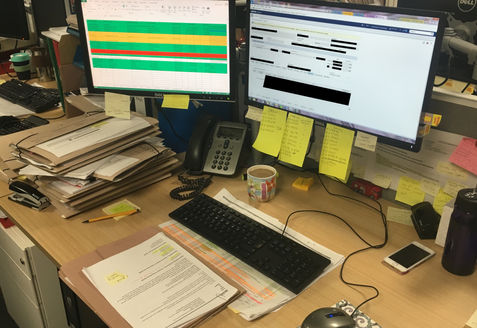My Portfolio / User Experience Research / Contextual Inquiry
Uncovering user needs for a research costing tool
Aim: Understand the processes involved in costing and grant management at a university to identify user needs and the extent to which these align with the functionality of the existing costing system.
Problem
Academic research grants at the University of Cambridge (UoC) are costed and approved using a specific tool, which users find hard to use. A survey conducted by colleagues in the latter half of 2017 revealed that training and guidance tools for costing and pricing have limited positive impact on the user's ability to navigate through the grant management process, accounting for a high proportion of enquiries and complaints made to the Research Office (RO).
This was not just a tooling issue, and so I set out to conduct a contextual inquiry (consisting of shadowing and asking questions) to get a sense of the real use cases and associated difficulties.
We needed to understand the extent to which the individual features and functions of that system were compatible with the costing and grant management process at the University. Specifically, we wanted to uncover and map the pain points of Research Office (RO) grant management teams, Departmental Administrators (DAs), and Principle Investigators (PIs) so that we could gather requirements for specific improvements to the costing tool.
Process
Following discussions with stakeholders, I observed users of the University's costing tool in the context of their daily tasks and activities. Users ranged from highly experienced to novice administrators and researchers across University departments. The aim was to identify varying needs throughout the grant application, set-up, and management processes in order to assess the suitability of the costing tool in its current state.

I did this by shadowing and interviewing individual Departmental Administrators (DAs) and grant management teams for different University departments. I supplemented this with insight into the interactions necessary for a Principle Investigator (PI) to achieve particular grant-related goals by asking PIs to walk me through an example of the grant application and management process, sometimes in the presence of their DA or Research Grant Administrator (RGA) for further insight.
This research was followed by a value proposition canvas exercise and workshop with Stakeholders to establish which user needs were met by the functionality of the current costing system, and where there were gaps.
Outcomes
The insights from this research were used to create a list of the main usability issues with the costing tool itself and some potential quick wins.
The research was additionally used to inform the design of a Research Dashboard, created to help simplify the grant management process by allowing users to visualise their grants based on data collated from various sources that would otherwise be difficult to access and make sense of.
With colleagues, I created and then merged three journey maps (for administrators, RO teams, and PIs) into an experience map, which was then used to highlight issues we wanted to solve with the dashboard.
This informed group design sessions, where we ideated about how to solve common problems with grant management.


The aim was to understand the problem space by seeing what the users see, how they worked as a team, and how the tool was used amongst other systems and processes. This way, I could get better insight into the source of problems, and not just the symptoms.
It was hard to communicate the benefit of this over other methods that stakeholders suggested, such as interviews with the head of each team I wanted to shadow in the RO. This was exacerbated by email communication to organise sessions. The ideal situation would be to set the right expectations by meeting all the stakeholders face-to-face early in the process, which is something I now insist on doing as early as possible. I also avoid confusion by referring to these sessions as contextual interviews.




